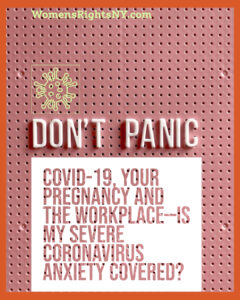
I’m pregnant, due in June and incredibly anxious about giving birth in a hospital. I’m having a hard time concentrating at work and my boss is harassing me. Do I have any recourse?
Yes, your pregnancy-related severe anxiety regarding giving birth in a hospital during this escalating and unprecedented American coronavirus pandemic is covered by the law.
First, if you work in NYC, your pregnancy-related anxiety is absolutely covered under the city’s Pregnant Workers Fairness Act, as the law requires your employer to be flexible with you and adjust the terms and conditions of your employment just because you’re pregnant, so being severely anxious and worried about your health and the health of your unborn child—especially as you consider giving birth in a NYC hospital during the next few months while coronavirus cases reach their apex—is completely understandable and absolutely covered by NYC law.
If you work anywhere in NY outside of the city, you are still covered and entitled to protection and flexibility under the NYS Human Rights Law, as the law requires all employers to reasonably accommodate pregnant women and their known pregnancy-related conditions that inhibit the exercise of a normal bodily function, or is demonstrable by medically accepted clinical or laboratory diagnostic techniques.
A normal bodily function is anything such as sleep, walking, standing, etc., and the second part of the definition—demonstrable by medically accepted diagnostic techniques just means that as long as your medical provider can document the issue as a medical, physical, structural or emotional problem, you are good to go and qualified to be granted pregnancy-related flexibility.
The only caveat is that once your employer provides the requested accommodation, you must be able to perform the activities involved in the job held, so if you can’t actually work even with the adjustment or accommodation, then it’s not discriminatory—you are just considered disabled until you can work again, and must apply for disability or unemployment insurance benefits.
And if you work anywhere in the country for an employer with at least 15 employees, you are still entitled to flexibility for your severe pregnancy-based anxiety in the time of coronavirus.
The Pregnancy Discrimination Act (“PDA”) states that women affected by pregnancy or related conditions must be treated in the same manner as other employees who are “similar in their ability or inability to work.”
So, a pregnant employee should not be denied a needed adjustment that the employer provides to other employees for other reasons, but who are similar in their ability or inability to work.
In plain English, if your employer grants work adjustments to accommodate other non-pregnant employees who are sick, injured, or temporarily disabled for any other reason (they do), then your employer must be flexible with you, too, for your pregnancy-based challenges.
Just as powerful and protective is the Americans with Disabilities Amendments Act of 2008 (ADAAA), an amendment to the Americans with Disabilities Act (“ADA”) that substantially broadens the ADA to cover accommodation requests of pregnant women, for conditions that substantially limit a major life activity, making these conditions disabilities under federal law.
So, for example, pregnancy-related sciatica, anemia, preeclampsia, and gestational diabetes, would all be covered under the ADAAA, but so would pregnancy-based insomnia, orthopedic problems and, severe anxiety caused by your pregnancy in this unprecedented time of the coronavirus, if that emotional turmoil “substantially limits a major life activity,” such as sleeping, walking, eating, etc. Under the circumstances, that’s sort of a no-brainer, right? Your anxiety is certainly interfering with one or more major life activities, as long as your OB agrees.
As pregnancy is itself a temporary condition, these “disabilities” will generally cease once your baby is born, so it is not difficult to meet the burden required for an accommodation if your medical provider writes a letter on your behalf documenting your pregnancy-related difficulties, even if the “pregnancy-based medical condition” is as common as severe morning sickness.
If you’re having difficulties at work caused by your pregnancy, maternity leave or postpartum workplace issues and want to consult with Jack Tuckner, please contact him or Deborah O’Rell, or visit our website, blog or YouTube channel for additional pregnancy discrimination information. We remain open will promptly schedule a phone or teleconference consultation.
